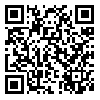1. 1. Munsch CL. Her support, his support: money, masculinity, and marital infidelity. Am Sociol Rev. 2015;80(3):469–95. [
DOI]
2. 2. Harris C. Characteristics of emotional and physical marital infidelity that predict divorce [Ph.D. dissertation]. [San Diego, US]: Alliant International University;2018.
3. 3. Artuch-Garde R, González-Torres MDC, de la Fuente J, Vera MM, Fernández-Cabezas M, López-García M. Relationship between resilience and self-regulation: a study of spanish youth at risk of social exclusion. Front Psychol. 2017;8:612. [
DOI]
4. 4. Hu T, Zhang D, Wang J. A meta-analysis of the trait resilience and mental health. Personality and Individual Differences. 2015;76:18–27. [
DOI]
5. 5. Hemmati M, Maddahi ME, Hoseinian S. Comparison the effectiveness of couple therapy based on schema therapy with couples therapy based on acceptance and commitment therapy on family resiliency of couples. Journal of Woman and Family Studies. 2018;6(2):145–63. [Persian] [
DOI]
6. 6. Shackelford TK, Buss DM, Weekes-Shackelford VA. Wife killings committed in the context of a lovers triangle. Basic and Applied Social Psychology. 2003;25(2):137–43. [
DOI]
7. 7. Baucom DH, Snyder DK, Gordon KC. Helping couples get past the affair: a clinician’s guide. 1st ed. The Guilford Press; 2011.
8. 8. Fischer MS, Baucom DH, Cohen MJ. Cognitive-behavioral couple therapies: review of the evidence for the treatment of relationship distress, psychopathology, and chronic health conditions. Fam Process. 2016;55(3):423–42. [
DOI]
9. 9. Bélanger C, Laporte L, Sabourin S, Wright J. The effect of cognitive-behavioral group marital therapy on marital happiness and problem solving self-appraisal. The American Journal of Family Therapy. 2015;43(2):103–18. [
DOI]
10. 10. Gharagozloo N, Moradhaseli M, Atadokht A. Compering the effectiveness of face to face and virtual Cognitive-behavioral Couples Therapy on the Post-traumatic stress disorder in Extra-Marital Relations. Journal of Counseling Research. 2018;17(65):187–210. [Persian] [
Article]
11. 11. Shayan A, Taravati M, Garousian M, Babakhani N, Faradmal J, Masoumi SZ. The effect of cognitive behavioral therapy on marital quality among women. Int J Fertil Steril. 2018;12(2):99–105. [
DOI]
12. 12. Dugal C, Bakhos G, Bélanger C, Godbout N. Cognitive-behavioral psychotherapy for couples: an insight into the treatment of couple hardships and struggles. In: Şenormancı Ö, Şenormancı G, editors. Cognitive behavioral therapy and clinical applications. InTech; 2018.
13. 13. Delavar A. Theoretical and practical principles of research in the humanities and social sciences. Tehran: Roshd Pub;2011. [Persian]
14. 14. Connor KM, Davidson JRT. Development of a new resilience scale: the Connor-Davidson Resilience Scale (CD-RISC). Depress Anxiety. 2003;18(2):76–82. [
DOI]
15. 15. Mohammadi M, Jazayeri AR, Rafi’i AH, Jokar B, Pourshahbaz A. Investigation of resilience factors in people at risk of drug abuse. Quarterly Journal of New Psychological Research. 2006;1(2&3):193-214. [Persian]. [
Article]
16. 16. World Health Organization. The world health organization quality of life (WHOQOL)-BREF [Internet]; 1996 [cited 2017 Jan 17]; [
Article]
17. 17. Nejat S, Montazeri A, Holakouie Naieni K, Mohammad K, Majdzadeh SR. The World Health Organization quality of Life (WHOQOL-BREF) questionnaire: Translation and validation study of the Iranian version. Journal of School of Public Health and Institute of Public Health Research. 2006;4(4):1–12. [Persian] [
Article]
18. 18. Khanjani Veshki S, Shafiabady A, Farzad V, Fatehizade M. A comparison of the effectiveness of cognitive–behavioral couple therapy and acceptance and commitment couple therapy on Conflicting Coupleâs Marital Intimacy in Isfahan. Knowledge & Research in Applied Psychology. 2017;17(4):31-40. [Persian] [
Article]





